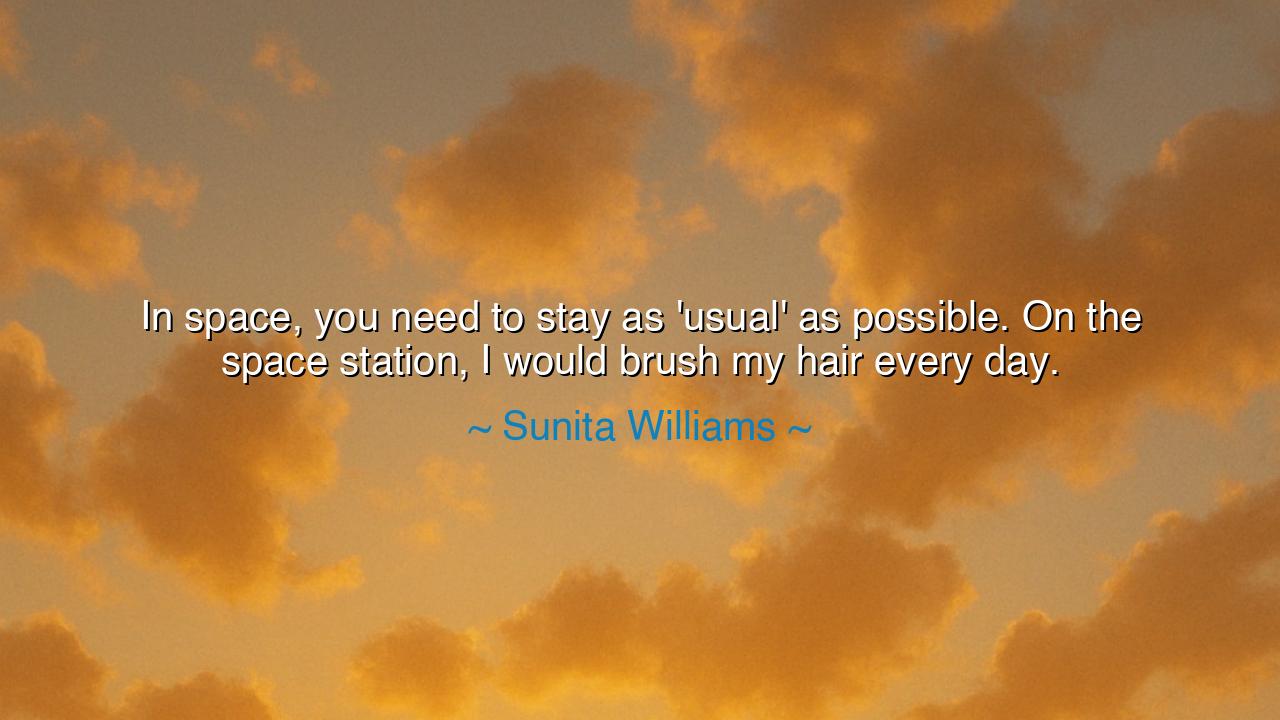
In space, you need to stay as 'usual' as possible. On the space
In space, you need to stay as 'usual' as possible. On the space station, I would brush my hair every day.






Hear, O children of the future, for the words of Sunita Williams carry a profound message about the nature of humanity and the power of routine in the face of the unknown. She said, "In space, you need to stay as 'usual' as possible. On the space station, I would brush my hair every day." These words, seemingly simple, speak to the deeply human need for normalcy and stability, even in the most extraordinary and alien of circumstances. In the vastness of space, where everything is foreign and unpredictable, it is the familiar, the everyday rituals, that provide the anchor for the soul.
In the ancient world, the concept of routine was not just a matter of habit but of order—an essential element in the chaos of life. The Egyptians, for example, were known for their meticulous daily practices, whether in the temples of their gods or in the cultivation of their lands. Routine was a way to maintain balance in a world that could seem overwhelming and uncontrollable. Rituals—whether personal, spiritual, or communal—allowed people to maintain a sense of continuity amidst the ever-changing flow of life. In this way, the act of brushing one's hair, or any other seemingly simple task, was not merely about appearance, but about the deeper need for stability and comfort in an uncertain world.
Think, too, of the great warriors of the ancient world, such as Hector in the Iliad, who, despite the looming threat of war, adhered to the routines of leadership and responsibility. Before battle, he would armor himself, not simply as an act of preparation but as a ritual that tied him to the traditions and values of his people. The act of putting on armor was a way to center himself, to remind himself of his purpose and identity. In the same vein, Williams’ daily act of brushing her hair in the chaos of space is a ritual that grounds her, reminding her of her humanity amidst the vast, cold emptiness of the cosmos. It is a symbol that even in the most extreme environments, we must find ways to maintain order and connection to the familiar.
The space station, as Williams describes it, is not just a place of exploration; it is a microcosm of human life in all its complexities. Floating in the vacuum of space, one might expect that the unfamiliar surroundings would completely strip away human needs and desires. But Williams teaches us that it is in the small, everyday acts—the brushing of hair, the making of meals, the maintenance of personal hygiene—that we find the strength to endure and thrive in such an environment. These acts are not trivial; they are the very essence of normalcy in an otherwise alien world. The human spirit, it seems, requires the familiar, the known, the routine, to weather the storms of life—whether those storms are physical, emotional, or cosmic.
Consider the story of Neil Armstrong, the first man to walk on the moon, whose monumental achievement transcended the bounds of human history. Yet, even amidst the awe-inspiring moment of standing on the surface of another world, Armstrong and his fellow astronauts maintained their connection to routine. They followed strict protocols, from the timing of their movements to the daily rituals of communication with mission control. Armstrong did not simply drift in the unknown; he anchored himself to a method that ensured his survival and success. In the same way, Williams’ ritual of brushing her hair in the sterile environment of the space station is a symbol of her ability to remain grounded, even as she ventures into the unfamiliar and infinite.
The lesson in Williams’ words is clear: normalcy is the bedrock upon which the human spirit can endure. When faced with disruption, whether in space or in the challenges of life, it is often the smallest, most mundane acts that give us the strength to keep moving forward. Routine does not simply bring order; it brings comfort, stability, and connection to what we know, reminding us of our humanity even in the most extreme circumstances. The act of brushing one’s hair, or performing any other small task, becomes a ritual that fortifies the spirit and the mind, grounding us in the face of the unknown.
So, O children of the future, take this wisdom to heart. When you face the unknown—whether in the vast reaches of space, the challenges of your daily life, or the great uncertainties of the world—remember that routine is not a burden but a strength. In the simplest of actions, you will find the power to endure, to stay connected, and to remain grounded. Find your own rituals, those small, everyday acts that bring comfort and stability to your soul. They are not mere habits, but the lifelines that will carry you through the greatest challenges. Like Williams in space, let these rituals anchor you, and in doing so, you will find the courage to face whatever unknowns lie ahead.






AAdministratorAdministrator
Welcome, honored guests. Please leave a comment, we will respond soon